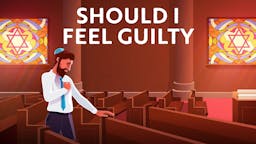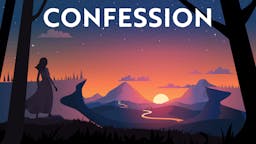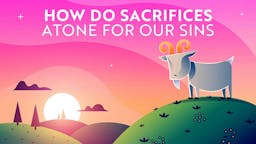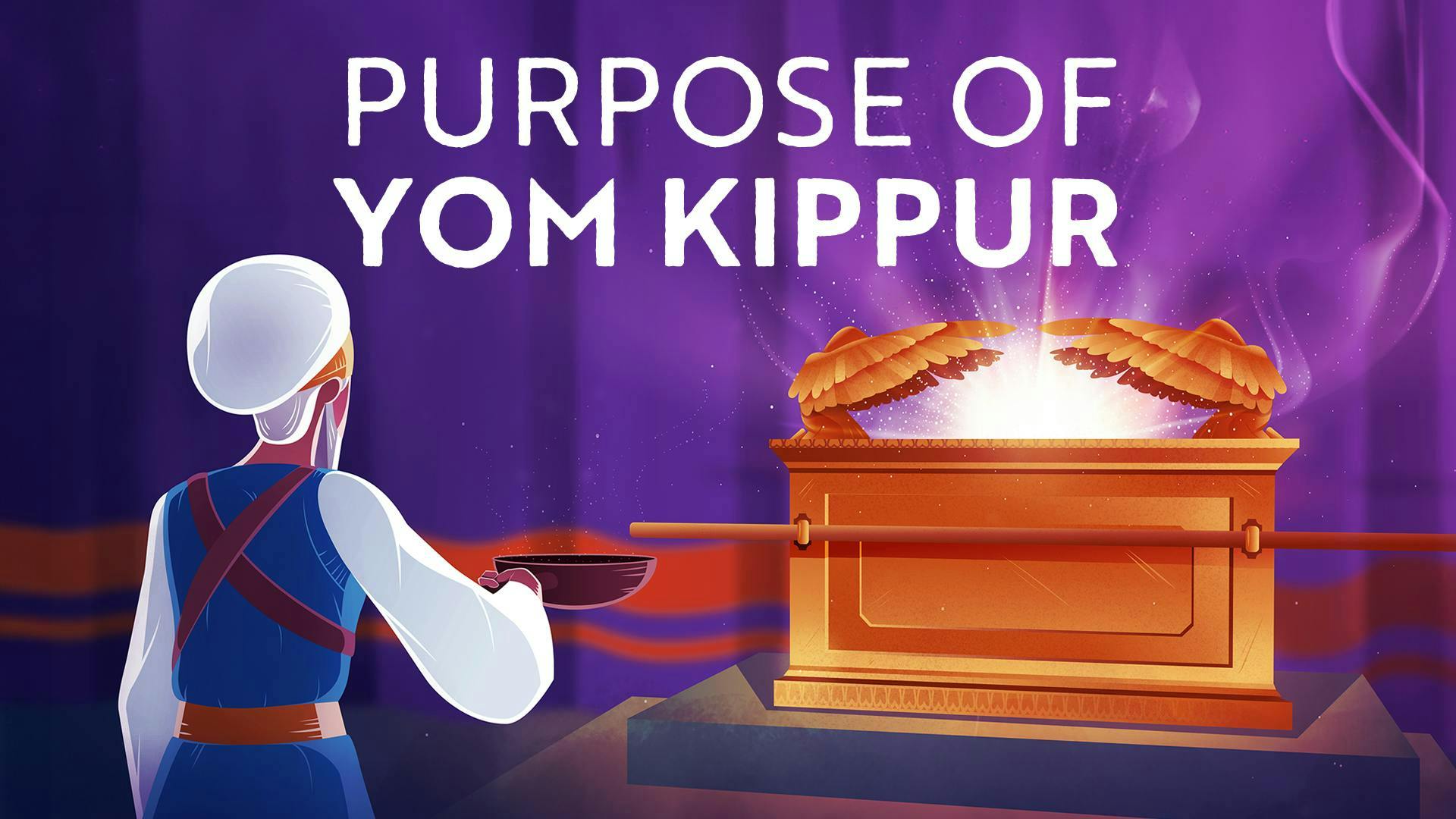Why do we call Yom Kippur a Day of "Awe" ?
D'var Torah for Yom Kippur
By Evan Weiner | 11 March 2024 | 5 Minute Read
Yom Kippur, together with Rosh Hashana, make up the time of the year we call the “Yamim Noraim,” which literally means “the days of awe.” But what exactly do we mean that they are “days of awe”? What exactly is “awe”? It sounds awfully scary. And why would we associate that feeling with the day of Yom Kippur?
If you've ever been to shul (synagogue) on Yom Kippur, you probably understand why I would think that Yom Kippur being a “day of awe” refers to something frightening. Just take a look at the machzor (prayer book of Yom Kippur), and you’ll see just how solemn the davening (liturgy) is. It talks about who’s going to live and who’s going die – whether by fire, sword, or water. It’s pretty terrifying.
But, if you think for a second about what's actually happening on this day – the Torah (Leviticus 16:30) actually says it's a day when we are forgiven for our sins and receive a spiritual cleansing – that's a wonderful thing. Who wouldn’t want to be totally cleansed and forgiven for all their wrongdoings? That’s a really happy occasion to celebrate. In fact, the Sages of the Talmud (Taanit 30b) say that there is no more festive day in the whole Jewish calendar than Yom Kippur. So, could our conception of Yom Kippur as a scary day be incorrect? I mean, that sense of dread seems so incongruent with the joyous state of forgiveness and purity that the Torah seems to define as the purpose of the day. So why, then, should Yom Kippur be associated with “awe”?
The Torah’s strange introduction to Yom Kippur
When we look at the Torah’s text introducing Yom Kippur, we’ll find something else quite puzzling. That is to say, not only is there something confusing about the disconnect between our typical associations with Yom Kippur and the Torah’s explanation of the holiday, but the Torah’s own introduction to the holiday is also really strange.
Let me explain what I mean, and to do that, I’d like to propose a little thought experiment for you. We alluded earlier to the Torah’s own definition of Yom Kippur’s purpose (Leviticus 16:30): “כִּי־בַיּוֹם הַזֶּה יְכַפֵּר עֲלֵיכֶם לְטַהֵר אֶתְכֶם מִכֹּל חַטֹּאתֵיכֶם לִפְנֵי יְקוָה תִּטְהָרוּ” – “For on this day, you will receive atonement to purify you from all your sins; before God you will be purified.” Now, put yourself in God's metaphysical shoes and imagine that you were the writer of the Torah and that you were going to introduce the world to this idea of Yom Kippur. How would you do it?
Here’s how I’d do it: I would get right down to the point: “God said to Moshe, saying, tell everyone, there's going to be this wonderful day when, once a year, I will purify you. And I will forgive you for all your sins.” Something along those lines – something that highlights this really great, joyous function of the day. You know, then I'd probably give the date, time, and location – all those other details so you know how to RSVP.
But that is not at all how the Torah introduces Yom Kippur. The Torah doesn’t start with the topic sentence focusing on the main idea of the holiday. Instead, we get something very strange. We have to read about how Aharon, the high priest, is not allowed to enter the holy of holies any time he wants. He is only allowed to enter if he follows this long, long list of procedures, nearly 30 pesukim long. And it isn’t even until the end of the procedures that we finally find out when the high priest does all of this, on Yom Kippur, or why he should do this whole procedure on that day, “כִּי־בַיּוֹם הַזֶּה יְכַפֵּר עֲלֵיכֶם לְטַהֵר אֶתְכֶם מִכֹּל חַטֹּאתֵיכֶם לִפְנֵי יְקוָה תִּטְהָרוּ” – “because on this day, you will receive atonement to purify you from all your sins; before God you will be purified.”
Why are we only getting to this at the end of the whole chapter about Yom Kippur? Isn’t this the topic sentence? Isn't this what Yom Kippur is all about? Shouldn't that have been all the way back at the beginning? The Torah’s introduction to this holiday just seems to be topsy-turvy. What's the logic in describing Yom Kippur the way the Torah actually does?
A new understanding of Yom Kippur
So now we’re left very confused. The commonly held view of Yom Kippur as a scary day seems to be contradicted by the Torah’s definition of Yom Kippur as a wonderful day of purifying and cleansing of sin. But when we look at the Torah, that joyous definition is called into question by all this heavy emphasis on the procedure for entering the holy of holies that seems to drown out any discussion of forgiveness for our sins. So in the end, what is Yom Kippur really all about?
Watch this video, in which Rabbi David Fohrman challenges our preconceived notions of what Yom Kippur truly means and presents a clear, new understanding of this joyous and holy day. Subscribe now to add meaning to your weekly parsha learning or your yearly observance of Yom Kippur, and you’ll be inspired by the beauty of the Torah.
More Yom Kippur Videos

The Book Of Jonah: What's The Deep Lesson?
Video series • Part 1 of 7 • 6 min
The Book of Jonah reads almost like a child’s story, and the message seems just as simple: “It’s good to do teshuva.” But a close read of the text reveals a much more sophisticated tale, with a profound lesson that has deep relevance for our modern lives.

The High Holidays: Should I Feel Guilty?
Video • 33 min
Guilt can can inspire us to grow — but it can also be overwhelming, crippling. How can we account for our actions over the past year in a way that is productive and spiritually healthy?

Struggling to Connect to God on the Days of Awe
Video series • Part 1 of 4 • 8 min
How can I attain closeness with a God who is so beyond my comprehension? And why would the Creator of the Universe care about my prayers? Is God even listening?

Teshuva: Is There a Wrong Way to Repent?
Video series • Part 1 of 4 • 8 min
Repentance is an emotional and deeply personal process — yet Judaism has specific laws that govern exactly how we’re supposed to do it. Can there really be a “wrong” way to repent?

Commentary On Unetaneh Tokef - The High Holiday’s Scariest Prayer
Video • 1 hour, 11 min
At the center of the High Holidays' prayer service is the passage "Unetaneh Tokef." The powerful and dramatic prayer borrows imagery from the story of Elijah. A closer look at this biblical story sheds light on God's relationship of justice and mercy with His people, and helps us understand this prayer in a deeper way.

Understanding The Day Of Atonement Rituals
Video • 15 min
We associate Yom Kippur with prayer and sitting in synagogue all day. But back then, it involved goats and lotteries and sacrifices and sprinkling blood and incense and clouds. How do those weird rituals grant forgiveness for our sins? It sounds magical… and irrational. Let's study this to explore the essence of Yom Kippur.
Yom Kippur Learning Guides
Teacher Guide: The (Surprising) Meaning & Purpose Of Yom Kippur
Printable Guide
A Teacher’s lesson plan and worksheet for: The (Surprising) Meaning & Purpose Of Yom Kippur

Jonah
Printable Guide
A printable PDF study guide to accompany our course on the Book of Jonah.
High Holiday Reader
Printable Guide
Enhance your Yomim Noraim with our new High Holiday Reader.
More Yom Kippur Content
What is Aleph Beta?
Aleph Beta is a unique kind of Torah library. Led by our founder, Rabbi David Fohrman, we are dedicated to high-level, textual Torah learning for adults that is intellectually and spiritually sophisticated, that enlivens your Jewish practice and helps you forge a deeper connection to God. Whether you’ve been learning in yeshiva for years or you’re just beginning your Torah journey, you’re sure to find something meaningful and surprising waiting for you here.
Browse our library of over 1,000 beautifully produced animated videos, podcasts, deep dive courses, and printable guides. Topics include the weekly parsha, Jewish holidays & fast days, laws & mitzvot, prayers, relationships, big philosophical ideas and more. Have something to say at the Shabbos table that will amaze your family and guests and bring deep meaning into their lives.


